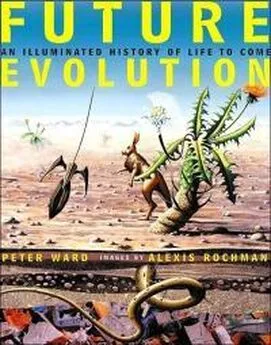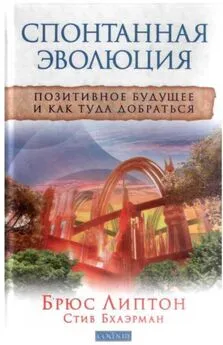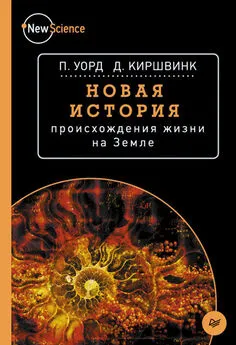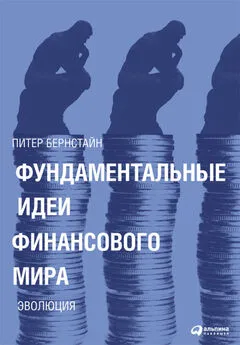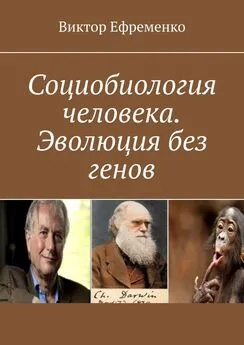Питер Уорд - Эволюция будущего
- Название:Эволюция будущего
- Автор:
- Жанр:
- Издательство:неизвестно
- Год:2001
- ISBN:нет данных
- Рейтинг:
- Избранное:Добавить в избранное
-
Отзывы:
-
Ваша оценка:
Питер Уорд - Эволюция будущего краткое содержание
Эволюция будущего - читать онлайн бесплатно полную версию (весь текст целиком)
Интервал:
Закладка:
Ehrlich, P. 1987. Population biology, conservation biology, and the future of humanity. Bioscience 37: 757-763.
Eldredge, N. 1991. The Miner’s Canary: Unraveling the Mysteries of Extinction. New York: Prentice Hall.
Ellis, J., and D. Schramm. 1995. Could a supernova explosion have caused a mass extinction? Proceedings of the National Academy of Sciences U.S.A . 92: 235-238.
Erwin. D. 1993. The Great Paleozoic Crisis: Life and Death in the Permian. New York: Columbia University Press.
Erwin, D. 1994. The Permo-Triassic extinction. Nature 367: 231-236.
Erwin, D. H. 1993. The origin of metazoan development. Biological Journal of the Linnean Society 50: 255-274.
Erwin, T. 1991. An evolutionary basis for conservation strategies. Science 253: 750-752.
Fuller, E. 1987. Extinct Birds. New York: Facts on File Publications.
Gagne, W. 1988. Conservation priorities in Hawaiian natural systems. BioScience 38: 264-271.
Garrett, L. 1994. The Coming Plague: Newly Emerging Diseases in a World out of Balance . New York: Penguin.
Gehrels, Т., ed. 1994. Hazards due to Comets and Asteroids. Tucson: University of Arizona Press.
Gleiser, M. 1997. The Dancing Universe: From Creation Myths to the Big Bang. New York: Dutton.
Gott, J. 1993. Implications of the Copernican Principle for our future prospects. Nature 363: 315-319.
Goudie, A., and H. Viles. 1997. The Earth Transformed . Oxford: Blackwell.
Gould, F. 1991. The evolutionary potential of crop pests. American Scientist 79: 496-507.
Gould, 8. 1994. The evolution of life on Earth. Scientific American 271: 85-91.
Gould, S. J. 1986. Wonderful Life: The Burgess Shale and the Nature of History . New York: W. W. Norton.
Gould, S. J. 1991. The disparity of the Burgess Shale arthropod fauna and the limits of cladistic analysis: Why we must strive to quantify morphospace. Paleobiology 17: 411 — 423.
Grayson, D. 1991. Late Pleistocene mammalian extinctions in North America: Taxonomy, chronology and explanations. Journal of World Prehistory 5: 19.
Gribbin, J. R. 1990. Hothouse Earth: The Greenhouse Effect and Gaia . New York: Grove Weidenfeld.
Groombridge, В., ed. 1992. Global Biodiversity: Status of the Earth’s Living Resources . London: Chapman and Hall.
Grotzinger, J. P., 8. A. Bowring, B. Saylor, and A. J. Kauffman. 1995. New biostratigraphic and geochronological constraints on early animal evolution. Science 270: 598-604.
Hallam, A. 1994. The earliest Triassic as an anoxic event, and its relationship to the End-Paleozoic mass extinction. In Canadian Society of Petroleum Geologists , Memoir 17, 797-804.
Hallam, A., and P. Wignall. 1997. Mass Extinctions and Their Aftermath. Oxford: Oxford University Press.
Hofman, P., A. Kaurfman, G. Halverson, and D. Schrag. 1998. A Neoproterozoic Snowball Earth. Science 281:1342-1346.
Hsu, K., and J. Mckenzie. 1990. Carbon isotope anomalies at era boundaries: Global catastrophes and their ultimate cause. In Global Catastrophes in Earth History , edited by V. Sharpton and P. Ward, 61-70. Special Paper 247. Boulder, CO: Geological Society of America.
Isozaki, Y. 1994. Superanoxia across the Permo-Triassic boundary: Record in accreted deep-sea pelagic chert in Japan. In Global Environments and Resources . Canadian Society of Petroleum Geologists, Mem. 17, p. 805-812.
Jablonski, D. 1991. Extinctions: A paleontological perspective. Science 253: 754-757.
Jablonski, D. 1993. The tropics as a source of evolutionary novelty. Nature 364: 142-144.
Joy, W. 2000. Why the future does not need us. Wired , April, 238-262.
Kappen, C., and F. H. Ruddle. 1993. Evolution of a regulatory gene family: HOM/Hox genes. Current Opinion in Genetics and Development 3: 931-938.
Kathen, A. de. 1996. The impact of transgenic crop releases on biodiversity in developing countries. Biotech, and Development Monitor , no. 28: 10-14.
Kirchner, J. W., and A. Weil. 2000. Delayed biological recovery from extinctions throughout the fossil record. Nature 404: 177-180.
Kirschvink, J. A. 1992. Paleogeographic model for Vendian and Cambrian time. In The Proterozoic Biosphere: A Multidisciplinary Study , edited by J. W. Schopf, C. Klein, and D. Des Maris, 567-581. Cambridge: Cambridge University Press.
Knoll, A., R. Bambach, D. Canfield, and J. Grotzinger. 1996. Comparative Earth history and Late Permian mass extinction. Science 273: 452-457.
Kruess, A., and T. Tscharntke. 1994. Habitat fragmentation, species loss and biological control. Science 264: 1581-1584.
Kurzweil, R. 1999. The Age of Spiritual Machines: When Computers Exceed Human Intelligence. New York: Viking.
Lewis, J. S. 1999. Comet and Asteroid Impact Hazards on a Populated Earth . San Diego: Academic Press.
Lovelock, J. 1979. Gaia: A New Look at Life on Earth . Oxford: Oxford University Press.
Maher, K. A., and J. D. Stevenson. 1988. Impact frustration of the origin of life. Nature 331: 612-614.
Marshall, C., and P. Ward. 1996. Sudden and gradual molluscan extinctions in the latest Cretaceous of Western European Tethys. Science 274: 1360-1363.
May, R. 1988. How many species are there on Earth? Science 241: 1441-1449.
McKinney, M., ed. 1998. Diversity Dynamics . New York: Columbia University Press.
Morante, R. 1996. Permian and early Triassic isotopic records of carbon and strontium events in Australia and a scenario of events about the Permian-Triassic boundary. Historical Geology 11: 289-310.
Myers, N. 1985. The end of the lines. Natural History 94: 2-12.
Myers, N. 1993. Questions of mass extinction. Biodiversity and Conservation 2: 2-17.
Myers, N. 1996. The biodiversity crisis and the future of evolution. The Environmentalist 16: 124-136.
Pace, N. R. 1991. Origin of life: Facing up to the physical setting. Cell 65: 531-533.
Paine, R., M. Tegner, and E. Johnson. 1998. Compounded perturbations yield ecological surprises. Ecosystem 1: 535 — 545.
Pimm, S. 1991. The Balance of Nature: Ecological Issues in the Conservation of Species and Communities . Chicago: University of Chicago Press.
Pimm, S., G. Russell, J. Gittleman, and Т Brooks. 1995. The future of biodiversity. Science 269: 347-354.
Pope, K., A. Baines, A. Ocampo, and B. Ivanov. 1994. Impact winter and the Cretaceous Tertiary extinctions: Results of a Chicxulub asteroid impact model. Earth and Planetary Science Express 128: 719-725.
Raff, R. A. 1996. The Shape of Life: Genes, Development, and the Evolution of Animal Form . Chicago: University of Chicago Press.
Rampino, M., and K. Caldeira. 1993. Major episodes of geologic change: Correlation, time structure and possible causes. Earth and Planetary Science Letters 114: 215-227.
Raup, D. 1979. Size of the Permo-Triassic bottleneck and its evolutionary implications. Science 206: 217-218.
Raup, D. 1990. Impact as a general cause of extinction: A feasibility test. In Global Catastrophes in Earth History , edited by V. Sharpton and P. Ward, 27-32. Special Paper 247. Boulder, CO: Geological Society of America.
Raup, D. 1991. A kill curve for Phanerozoic marine species. Paleobiology 17: 37-48.
Raup, D., and J. Sepkoski. 1984. Periodicity of extinction in the geologic past Proceedings of the National Academy of Sciences U.S.A . 81: 801-805.
Raven, P. 1990. The politics of preserving biodiversity. BioScience 40: 769-774.
Retallack, G. 1995. Permian-Triassic crisis on land. Science 267: 77-80.
Sagan, C., and C. Chyba. 1997. The early faint sun paradox: Organic shielding of ultraviolet-labile greenhouse gases. Science 276: 1217-1221.
Salvadori, К 1990. Rare Animals of the World . New York: Mallard Press.
Sepkoski, J. 1984. A model of Phanerozoic taxonomic diversity. Paleobiology 10: 246-267.
Schindewolf, O. 1963. Neokatastrophismus? Zeitschrift der Deutschen Geologischen Gesellschaft 114: 430-445.
Schwartzman, D., M. McMenamin, and Т Volk. 1993. Did surface temperatures constrain microbial evolution? BioScience 43: 390-393.
Sheehan, P., D. Fastovsky, G. Hoffman, C. Berghaus, and D. Gabriel. 1991. Sudden extinction of the dinosaurs: Latest Cretaceous, Upper Great Plains, U.S.A. Science 254: 835-839.
Sigurdsson, H., S. D’hondt, and S. Carey. 1992. The impact of the Cretaceous-Tertiary bolide on evaporite terrain and generation of major sulfuric acid aerosol. Earth and Planetary Science Letters 109: 543-559.
Sleep, N. H., K. J. Zahnle, J. F. Kasting, and H. J. Morowitz. 1989. Annihilation of ecosystems by large asteroid impacts on the Earth. Nature 342: 139-142.
Stanley, S. 1987. Extinctions . New York: W. H. Freeman and Company.
Stanley, S., and X. Yang. 1994. A double mass extinction at the end of the Paleozoic era. Science 266:1340-1344.
Stenseth, N. 1984. The tropics: Cradle or museum? Oikos 43: 417-420.
Stone, C., and D. Stone, eds. 1989. Conservation Biology in Hawaii . Honolulu: University of Hawaii Press.
Stuart, C., and Т Stuart. A field guide to the larger animals of Africa. Cape Town: Struik Publishers.
Teichert, C. 1990. The end-Permian extinction. In Extinction Events in Earth History , edited by E. Kauffman and O. Walliser, 161-190. New York: Springer-Verlag.
Towe, К. М. 1994. Earth’s early atmosphere: Constraints and opportunities for early evolution. In Early Life on Earth , edited by S. Bengston, 36-47. Nobel Symposium no. 84. New York: Columbia University Press.
Valentine, J. W. 1994. Late Precambrian bilaterians: Grades and clades. Proceedings of the National Academy of Sciences U. S. A. 91: 6751-6757.
Valentine, J. W., D. H. Erwin, and D. Jablonski. 1996. Developmental evolution of metazoan body plans: The fossil evidence. Developmental Biology 173: 373-381.
van Andel, Т. Н. 1985. New Views on an Old Planet . Cambridge: Cambridge University Press.
Vermeij, G. 1991. When biotas meet: Understanding biotic interchange. Science 253: 1099-1103.
Walker, J. C. G. 1977 Evolution of the Atmosphere. London: Macmillan.
Ward, P. 1990. The Cretaceous/Tertiary extinctions in the marine realm: A 1990 perspective: In Global Catastrophes in Earth History , edited by V. Sharpton and P. Ward, 425-432. Special Paper 247. Boulder, CO: Geological Society of America.
Ward, P. 1994. The End of Evolution . New York: Bantam Doubleday Dell.
Ward, P., and D. Brownlee. 2000. Rare Earth: Why Complex Life Is Uncommon in the Universe . New York: Copernicus (Springer Verlag).
Ward, P., and W. Kennedy. 1993. Maastrichtian ammonites from the Biscay region (France and Spain). Journal of Paleontology , Memoir 34 67.
Ward, P., W. J. Kennedy, K. MacLeod, and J. Mount. 1991. Ammonite and inoceramid bivalve extinction patterns in Cretaceous-Tertiary boundary sections of the Biscay Region (southwest France, northern Spain). Geology 19:1181.
Ward, P. D. 1990. A review of Maastrichtian ammonite ranges. In Global Catastrophes in Earth History , edited by V. Sharpton and P. Ward, 519-530. Special Paper 247. Boulder, CO: Geological Society of America.
Читать дальшеИнтервал:
Закладка:
